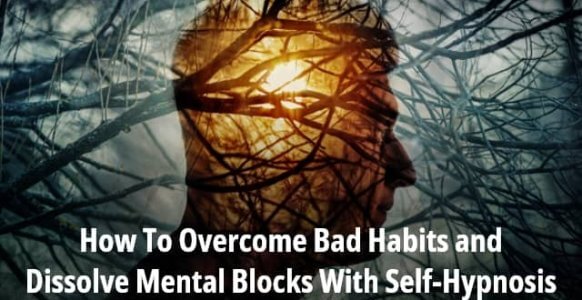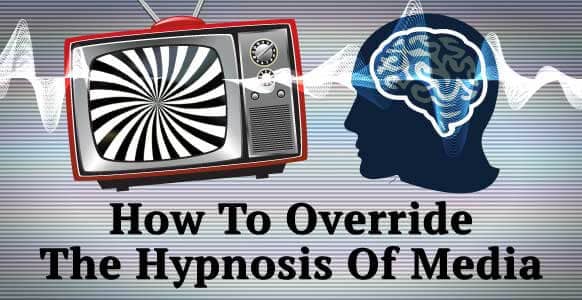
You know that stage hypnosis has the power to do enormous good.
You also know that laughter has the ability to bring you out of the darkest, deepest despair.
Put the two of them together, and what have you got… comedy stage hypnosis!
A powerful combination that can lift your subject’s mood while transforming their health, wellbeing, and immunity at the same time.
Is Comedy Stage Hypnosis Real?
When you see a stage hypnotist, what thoughts come into your mind?
Are you wondering whether or not what you’re witnessing is for real, or do you think that perhaps it’s some kind of elaborate setup?
Are the members of the audience pretending to be hypnotized, or are they being paid to make it look as convincing as possible?
The short answer is: no.
The first thing you need to remember is that there is only one form of hypnosis. Whether it’s stage hypnosis or hypnotherapy, the same things are going on.
A stage hypnotist doesn’t do anything differently to a hypnotherapist. They just do it using a different approach.
In both cases, the hypnotist’s initial objective is to get you to relax. In a hypnotherapy setting, this is important in order for you to be able to shut out the outside world and communicate with your unconscious mind.
In a stage hypnosis setting, being relaxed means you’re able to let go of your inhibitions. That means you’re far more likely to respond to the hypnotist’s suggestions if you are invited up onto the stage.
If you book a session with a hypnotherapist, chances are you know what’s going to happen. You’ll be told what to expect and how the hypnotist will use the power of suggestion to help you make changes for the better in your life.
Likewise, if you are invited onto the stage by a stage hypnotist, you know what’s probably going to happen. The hypnotist will use the power of suggestion to get you to do things you might not normally feel able to do.
The important thing to remember about this is pointed out by this self-hypnosis website. People who volunteer to become part of a stage hypnotist’s act are not being made to do anything. They’re being allowed to do something.
It’s exactly the same in a hypnotherapy session. You can’t be made to undergo hypnosis. You have to do it voluntarily.
Whether you see your hypnotist in an office or on a stage, the same rules will apply. You can’t be made to do anything that’s against your moral code.
Here’s another way to think of it. Suppose you visit a hypnotherapist because you want to give up smoking. You’ve heard that hypnosis has a fantastic track record of helping people kick the habit.
The hypnotist asks you to relax and perhaps close your eyes. Then they try to get you to focus on your breathing in an attempt to help you go deeper and deeper into a state of luscious relaxation.
But instead of going along with it, you keep opening your eyes to see what the hypnotist is doing. You aren’t able to relax because you’re not participating fully, and so the hypnotist is not able to put forward positive suggestions that will allow you to achieve your goal of giving up smoking.
In the same way, volunteers in a comedy hypnosis show have to be willing to do whatever the hypnotist asks them to do, as long as it doesn’t violate their moral code. But by the time they get up onto the stage the hypnotist already knows whether or not they’re going to make good subjects.
That’s because the hypnotist has done the same things many, many times before. They know that people who volunteer want to participate, because they want to be in the spotlight for their friends and family to see, even if it’s only for a few minutes.
And when they do silly or outrageous things on stage, it’s because they’re willingly taking part. They are hypnotized in the sense that they’re relaxed enough to let themselves go, to let their hair down, so to speak.
The other point to keep in mind is that, following a hypnotherapy session, you’ll probably feel more relaxed than you’ve ever felt before. People report feeling refreshed and as if a huge weight has been lifted from their shoulders.
That’s particularly the case, for example, with someone for whom hypnosis has provided relief from a chronic condition that perhaps traditional techniques have so far failed to alleviate.
Similarly, people who become so-called guinea pigs for a stage hypnotist’s show, also known as entertainment hypnosis, are usually made to perform foolish or mildly shocking acts that make the audience laugh. The whole purpose behind it is entertainment, and therefore the more laughter, the better.
Laughter is, as they say, the best medicine, and so the audience will leave the show feeling good, feeling like they’ve had a good time. The participants will also leave feeling good because they’ve played a part in the evening’s entertainment and were able to do things that they might never get the chance to do again, or that they would be too shy to do under normal circumstances.
Some people have the wrong idea about what hypnosis actually is. It isn’t something that happens to you but rather something that you participate in. Whether you’re sitting in a hypnotherapist’s office or sitting on a chair on stage as part of a hypnotist’s show, you are the only person that can allow himself or herself to be hypnotized.
Without your consent and full agreement, hypnosis cannot take place. The hypnotic process is a form of communication between two people: the subject and the hypnotist, so it isn’t something the hypnotist does to you but something he or she does with you.
Old Hollywood movies portray hypnotized people as robotic brainless zombies walking around as if in a daze. That’s total nonsense, of course. Hypnosis is simply a different state of mind that you can enter on your own many times in a single day.
Stage hypnotists put on a show because that’s what they’re getting paid to do. The people who volunteer to be hypnotized do actually get hypnotized, thanks to the hypnotist’s ability to choose members of the audience who will be compliant and easy to work with.
So stage hypnosis is just as real as any other version – it’s just a way of using hypnosis for entertainment rather than for therapeutic purposes.
The Facts About Comedy Stage Hypnosis Shows
Stage hypnosis is hypnosis that is performed in front of an audience with its main purpose being to entertain.
The addition of comedy gives it a lighter, fun element that helps to leave people feeling uplifted. It also shows them that hypnosis can be enjoyable and pleasurable.
Because let’s face it: the days when a hypnotist could stand in front of a crowd and deliver a serious show, hoping to impress them, are probably over.
There’s a lot of stress associated with modern life, and people want to be entertained during their downtime. They can choose to go to a cinema, a musical, the theatre, or somewhere similar where they know they’ll have a good time.
So the stage hypnotist has to be able to deliver the same thing.
Any type of stage hypnosis makes use of 3 basic strategies:
1. Stage Hypnosis Strategy #1: Participant compliance
The people on the stage have to be ready to comply with the hypnotist’s commands. They might be compliant due to peer pressure, knowing that the audience wants them to perform. Or they might be compliant because they’re total extroverts who just want to be part of the show.
But why they’re compliant isn’t as important as the fact that they are.
2. Stage Hypnosis Strategy #2: Participant selection
The hypnotist will test the volunteers a number of times to make sure they are suggestible. This begins from the moment they’re asked to come up onto the stage.
As a rule, only the most extroverted and willing members of the audience will volunteer. But even then, the hypnotist will test them further by asking them to do simple actions in order to check for compliance and to select the most suggestible from the bunch.
3. Stage Hypnosis Strategy #3: Audience deception
Historically, some hypnotists have made use of sleight-of-hand strategies to mislead the audience, usually for dramatic effect. This might have included whispering instructions to volunteers to act in a certain way or using stooges in the audience whose obedience other bona fide members of the crowd will then follow.
It’s common for a stage hypnotist to prime the audience even before selecting any volunteers.
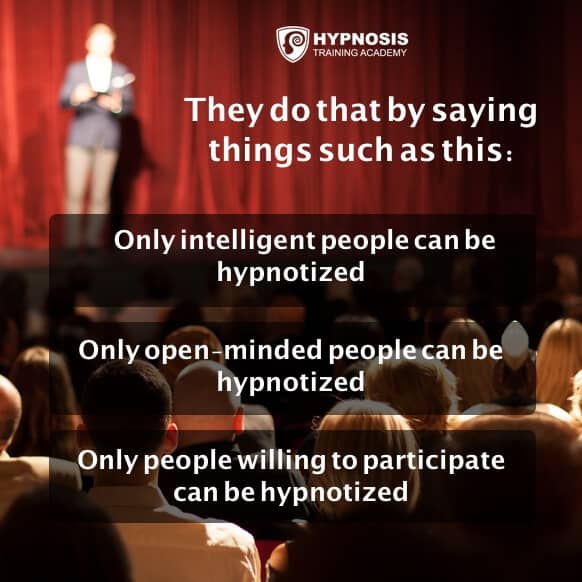
These ideas help to weed out the people who don’t really want to be hypnotized, such as members of the audience who might think they’re too clever and will, therefore, resist everything the hypnotist says.
Of course, the audience has chosen to be there, so they’re already in the mood for being hypnotized. And the people who willingly volunteer to go up on stage have already switched off their critical factor. These points tend to make things a little easier for the hypnotist.
Lastly, you have to remember that it’s a show.
The audiences have paid good money to see people doing stupid things, making fools of themselves, and generally having a good time.
If the show isn’t entertaining, they’ll post bad reviews, and there won’t be much of an audience for the next one.
The entertainment factor is part of the reason why comedy hypnosis is so popular. But there’s another equally pertinent reason why comedy features in so many stage hypnosis show.
Why Is Comedy Such An Important Part Of The Act?
In a nutshell, the comedy element is there because it makes people laugh.
Simple as that.
When they laugh, they feel good. And knowing that hypnosis makes them feel good just might get them curious about using it for other aspects of their life.
Even if they weren’t on stage themselves.
After all, if a hypnotist can make someone dance whenever they hear a bit of upbeat music, then what else can they do?
If they can make someone fall asleep, or freeze their arm, or make them think they can speak a foreign language, then just imagine what other things they can achieve.
Someone who wants to give up smoking, for example, after trying everything else. Or someone who wants to manage their weight. Or someone who wants to boost their confidence. Or to overcome a phobia.
Once you start thinking about the possibilities, the options are almost endless. And it’s the comedy that opens the floodgates.
But the laughter has another less obvious purpose as well. It’s a well-known fact that laughter delivers a whole host of health benefits.
For starters, it’s impossible to feel stressed when you’re laughing. But that’s just the tip of the iceberg.
Here’s what the folks at the Mayo clinic say laughter is good for:
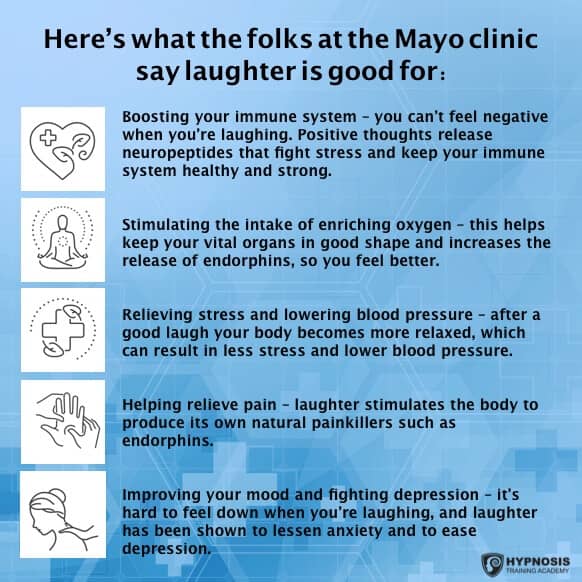
So laughter is good for your health. But not just your physical health.
There are plenty of benefits that laughter can bring to your mental health too, such as:
- Getting more enjoyment out of life
- Strengthening your resilience
- Strengthening your relationships
- Defusing conflict
- Easing tension
- Enhancing teamwork
Laughter relaxes your whole body and might even help you to live longer. According to a study in Norway, people who laugh a lot tend to outlive those who don’t.
Who knew humor was such a powerful force in keeping you healthy? But why is that the case?
What happens in your body when you laugh that makes this particular activity so remarkably beneficial?
What’s Going On In Your Body When You Laugh
The frontal lobe of your brain is in two halves, left and right. The left is the practical side that decides whether or not something is a joke. The right is the creative side that decides whether or not the joke is funny.
But there’s more to it than that. None of this would matter if it weren’t for your limbic system. That’s the part of your brain that experiences fear, anger and pleasure.
When the message goes from the frontal lobe to the limbic system (this joke is funny), the latter triggers the physical reaction that we call laughing.
Those are the mechanics believed to be behind laughter. But they make your body do a lot more than simply emit a chuckle or two.
Because when you laugh, your body physically changes. Your heart beats faster. Your pulse quickens. Your blood pressure rises. Your breathing rate changes and you take in extra oxygen.
On top of that, the level of the chemicals in your brain is altered.
Hormones that are good for your overall health and well-being (such as dopamine and endorphins) are increased, while those that can be harmful (such as cortisol) are reduced.
Laughter strengthens your immune system by increasing the production of antibodies that fight off disease. And there’s nothing better as a quick pick-me-up than having a good laugh at your favorite joke, sitcom or comedian.
In fact, a 1979 Canadian university study found that people with a healthy sense of humor were less prone to suffer from anxiety or depression.
Along the same lines, an article for PubMed by the Department of Physical Therapy, Sahmyook University states that laughter therapy has a “positive effect on the mental health and the immune system”.
They go on to say that laughter therapy is an “effective and scientifically supported” treatment for helping people improve their quality of life.
>>Related Article: What Is Self Hypnosis Used For? Discover How It Regulates These 6 Essential Chemicals So You Can Live A Happier & Healthier Life
Laughter Really Is The Best Medicine
So what does all of this information tell you?
It tells you that a good laugh has the power to keep you physically and mentally fit.
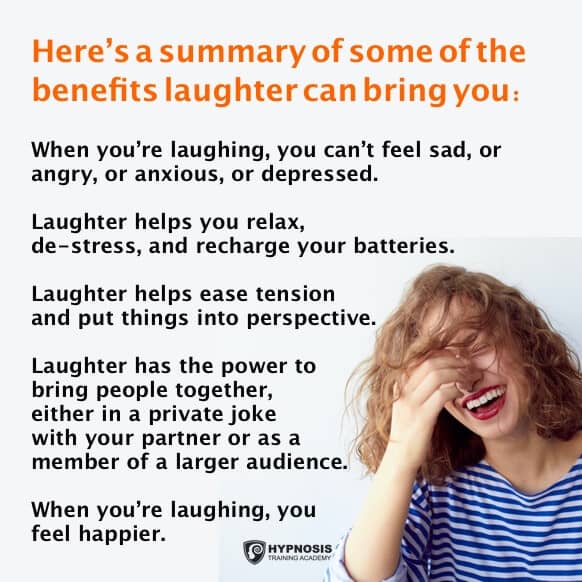
Perhaps that explains why so many stage hypnotists use comedy in their acts. It gives them a chance to show what they can do while at the same time providing some hilarious entertainment for their audience.
That includes big names like Marc Savard, who can be seen in Las Vegas. Then there’s the man known as the world’s fastest hypnotist, Don Spencer. Or Richard Barker, aka the Incredible Hypnotist, an expert comedy stage hypnotist who likes to help people understand what hypnosis really is.
And that’s an important point to remember. Whether stage hypnosis involves comedy or not, it is a powerful tool that can help change lives.
And even off the stage, even just one hypnosis session could be the difference between living a life full of potential and promise, or living a life weighed down by stagnation and doubt.
Hypnosis has so many practical applications that it would be impossible to list them all within the confines of this article.
Suffice it to say that whatever your subject’s need help with, hypnosis can come to the rescue. That might be improving their golf game, getting over a fear or phobia, managing weight, giving up an unhealthy habit like smoking, beating anxiety, or increasing confidence.
And if it can be done with humor in the mix, then the session (or show) is likely going to be even more pleasurable and enjoyable.
>> If you’re interested in hypnotherapy or want to improve your practice, check out our hypnotherapy courses.
If you’re interested in learning about hypnotherapy, but not sure what certification program is the right choice for you, book a DISCOVERY CALL today to learn more about Hypnosis Training Academy’s hypnotherapy programs. You may also email us at hypnosis@getquicksupport.com.




